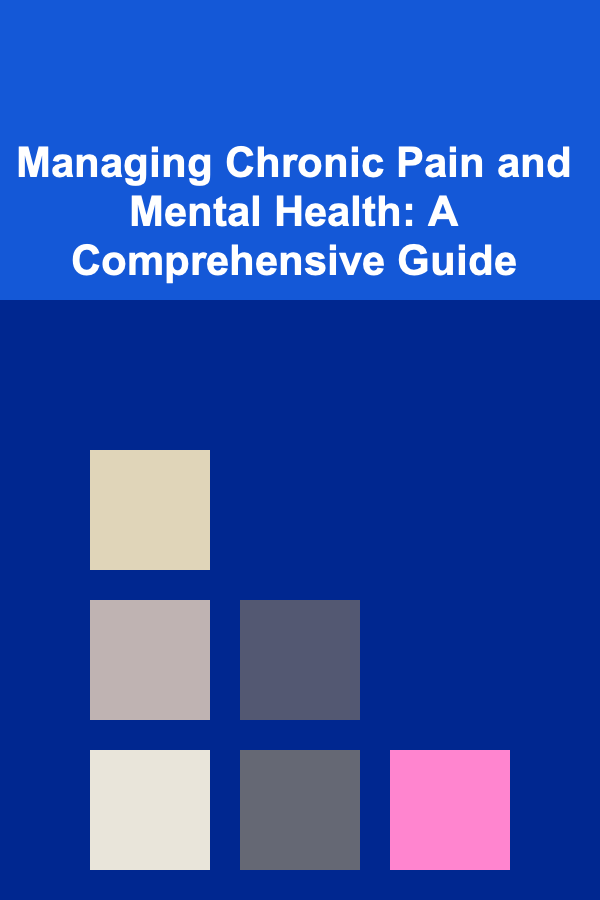
Managing Chronic Pain and Mental Health: A Comprehensive Guide
ebook include PDF & Audio bundle (Micro Guide)
$12.99$6.99
Limited Time Offer! Order within the next:

Chronic pain and mental health are deeply intertwined. Living with persistent pain can significantly impact mood, anxiety levels, and overall psychological well-being. Conversely, mental health conditions like depression and anxiety can exacerbate pain perception and make it more difficult to manage. This complex interplay requires a holistic approach that addresses both the physical and psychological aspects of the experience.
Understanding the Connection
The connection between chronic pain and mental health is bidirectional. Pain signals travel along nerve pathways to the brain, where they are processed and interpreted. However, this process isn't simply a one-way street. The brain can also modulate pain signals, either amplifying or suppressing them. Mental health conditions can disrupt this modulation, leading to increased pain sensitivity and reduced coping abilities. Furthermore, chronic pain can lead to significant lifestyle changes, such as reduced activity levels, social isolation, and financial strain, all of which can contribute to mental health problems.
The Impact of Chronic Pain on Mental Health
Chronic pain can lead to a range of mental health challenges, including:
- Depression: The constant discomfort, limitations, and emotional toll of chronic pain can significantly increase the risk of developing depression. Symptoms of depression, such as hopelessness, loss of interest in activities, and sleep disturbances, can further worsen the experience of pain.
- Anxiety: The uncertainty and fear associated with chronic pain can trigger anxiety. People with chronic pain may worry about the future, fear flare-ups, and experience increased anxiety in anticipation of painful activities. This can manifest as generalized anxiety disorder, panic disorder, or specific phobias related to pain triggers.
- Irritability and Mood Swings: Chronic pain can deplete energy levels and increase frustration, leading to irritability, mood swings, and difficulty regulating emotions. This can strain relationships and further contribute to feelings of isolation.
- Sleep Disturbances: Pain can interfere with sleep, making it difficult to fall asleep, stay asleep, or achieve restful sleep. Sleep deprivation, in turn, can exacerbate pain and contribute to mood disorders. This creates a vicious cycle that is difficult to break.
- Cognitive Impairment: Chronic pain can affect cognitive function, leading to difficulties with concentration, memory, and decision-making. This can impact work performance, daily tasks, and overall quality of life.
- Substance Abuse: In some cases, people with chronic pain may turn to alcohol or drugs to cope with their pain and emotional distress. This can lead to substance abuse problems, which can further complicate the management of both pain and mental health.
The Impact of Mental Health on Chronic Pain
Conversely, mental health conditions can influence the experience of chronic pain in several ways:
- Increased Pain Sensitivity: Depression and anxiety can alter the way the brain processes pain signals, leading to increased pain sensitivity and lower pain tolerance.
- Reduced Coping Abilities: Mental health problems can impair coping skills, making it more difficult to manage pain effectively. People struggling with depression or anxiety may have less energy and motivation to engage in self-care activities, such as exercise or relaxation techniques.
- Negative Thoughts and Beliefs: Negative thoughts and beliefs about pain can worsen the experience of pain. For example, catastrophizing (exaggerating the severity of pain) can lead to increased anxiety and avoidance behavior.
- Muscle Tension: Anxiety and stress can lead to muscle tension, which can contribute to pain, particularly in the neck, shoulders, and back.
- Changes in Pain Behavior: Mental health conditions can influence pain behavior, such as seeking medical care, taking pain medications, and engaging in activities that exacerbate pain.
Developing a Holistic Management Plan
Effective management of chronic pain and mental health requires a multidisciplinary and individualized approach. A holistic treatment plan should address the physical, psychological, and social aspects of the experience. This often involves a team of healthcare professionals, including physicians, psychologists, physical therapists, and other specialists.
Medical Management
Medical management of chronic pain focuses on reducing pain levels and improving physical function. This may involve:
- Medications: Various medications can be used to manage chronic pain, including:
- Pain relievers: Over-the-counter pain relievers, such as acetaminophen and ibuprofen, can be helpful for mild to moderate pain. Prescription pain relievers, such as opioids, may be used for more severe pain, but they should be used cautiously due to the risk of addiction and other side effects.
- Antidepressants: Certain antidepressants, such as tricyclic antidepressants and selective serotonin reuptake inhibitors (SSRIs), can be effective in treating chronic pain, even in the absence of depression. These medications can help to modulate pain signals and improve mood.
- Anticonvulsants: Anticonvulsants, such as gabapentin and pregabalin, are often used to treat neuropathic pain (pain caused by nerve damage).
- Muscle relaxants: Muscle relaxants can help to relieve muscle spasms and tension, which can contribute to pain.
- Injections: Injections of corticosteroids or local anesthetics can be used to relieve pain in specific areas of the body, such as the joints or spine.
- Nerve blocks: Nerve blocks involve injecting a local anesthetic near a nerve to block pain signals.
- Surgery: Surgery may be an option for some types of chronic pain, such as back pain or joint pain. However, surgery should be considered only after other treatment options have been exhausted.
- Physical Therapy: Physical therapy plays a crucial role in managing chronic pain. A physical therapist can develop an individualized exercise program to improve strength, flexibility, and range of motion. They can also teach pain management techniques, such as posture correction and body mechanics.
Psychological Therapies
Psychological therapies are essential for addressing the mental health aspects of chronic pain. These therapies can help people to develop coping skills, manage emotions, and improve their overall well-being.
- Cognitive Behavioral Therapy (CBT): CBT is a widely used therapy that helps people to identify and change negative thoughts and behaviors that contribute to pain and emotional distress. CBT techniques for chronic pain include:
- Cognitive restructuring: Challenging and changing negative thoughts about pain.
- Behavioral activation: Increasing engagement in enjoyable activities to improve mood and reduce pain.
- Pacing: Balancing activity and rest to avoid overexertion and flare-ups.
- Problem-solving: Developing strategies to cope with pain-related challenges.
- Acceptance and Commitment Therapy (ACT): ACT focuses on accepting pain as a part of life and committing to values-based actions despite pain. ACT techniques include:
- Mindfulness: Paying attention to the present moment without judgment.
- Values clarification: Identifying what is truly important in life.
- Committed action: Taking steps towards living a meaningful life, even with pain.
- Mindfulness-Based Stress Reduction (MBSR): MBSR is a program that teaches mindfulness techniques to reduce stress and improve coping skills. MBSR can be helpful for people with chronic pain who experience high levels of stress and anxiety.
- Relaxation Techniques: Relaxation techniques, such as deep breathing, progressive muscle relaxation, and guided imagery, can help to reduce muscle tension, anxiety, and pain.
- Biofeedback: Biofeedback is a technique that teaches people to control physiological responses, such as heart rate, muscle tension, and skin temperature. Biofeedback can be helpful for managing pain, anxiety, and stress.
- Group Therapy: Group therapy can provide a supportive environment for people with chronic pain to share their experiences, learn from others, and develop coping skills.
Lifestyle Modifications
Lifestyle modifications can play a significant role in managing chronic pain and mental health. These modifications include:
- Exercise: Regular exercise can improve physical function, reduce pain, and boost mood. Low-impact exercises, such as walking, swimming, and yoga, are often recommended for people with chronic pain.
- Healthy Diet: A healthy diet can provide the body with the nutrients it needs to heal and function properly. It's important to eat plenty of fruits, vegetables, whole grains, and lean protein. Avoid processed foods, sugary drinks, and excessive caffeine. An anti-inflammatory diet may also be beneficial for some individuals.
- Sleep Hygiene: Good sleep hygiene is essential for managing pain and mental health. Establish a regular sleep schedule, create a relaxing bedtime routine, and make sure your bedroom is dark, quiet, and cool.
- Stress Management: Managing stress is crucial for reducing pain and improving mental health. Practice relaxation techniques, engage in enjoyable activities, and seek social support.
- Social Support: Social support can provide a sense of connection, reduce isolation, and improve coping skills. Spend time with loved ones, join a support group, or volunteer in your community.
- Pacing and Activity Management: Learning to pace activities and manage energy levels is crucial. Breaking down tasks into smaller, manageable chunks and taking frequent breaks can prevent overexertion and pain flare-ups. It's important to find a balance between activity and rest.
Specific Strategies for Mental Health Challenges
Addressing specific mental health challenges requires tailored strategies:
Managing Depression
If you are experiencing symptoms of depression, such as persistent sadness, loss of interest in activities, fatigue, and difficulty concentrating, it's important to seek professional help. Treatment options for depression include:
- Antidepressant medication: Antidepressants can help to regulate mood and improve symptoms of depression.
- Psychotherapy: Therapy can help you to identify and address the underlying causes of your depression and develop coping skills. CBT and interpersonal therapy are often effective for treating depression.
- Lifestyle changes: Lifestyle changes, such as exercise, a healthy diet, and good sleep hygiene, can also help to improve symptoms of depression.
Managing Anxiety
If you are experiencing symptoms of anxiety, such as excessive worry, restlessness, and difficulty concentrating, it's important to seek professional help. Treatment options for anxiety include:
- Anxiety medication: Anti-anxiety medications can help to reduce anxiety symptoms.
- Psychotherapy: Therapy can help you to identify and manage anxiety triggers and develop coping skills. CBT and exposure therapy are often effective for treating anxiety.
- Relaxation techniques: Relaxation techniques, such as deep breathing and progressive muscle relaxation, can help to reduce anxiety.
Managing Sleep Disturbances
Improving sleep hygiene is crucial for managing sleep disturbances. In addition to the recommendations above, consider the following:
- Limit caffeine and alcohol intake, especially in the evening.
- Avoid screen time before bed.
- Create a relaxing bedtime routine.
- Consider using a white noise machine or earplugs to block out distracting sounds.
- If you can't fall asleep after 20 minutes, get out of bed and do something relaxing until you feel tired.
If sleep disturbances persist, consult with a doctor or sleep specialist to rule out underlying medical conditions.
The Role of Support Systems
Having a strong support system is invaluable for managing chronic pain and mental health. This includes:
- Family and friends: Sharing your experiences with loved ones can provide emotional support and reduce feelings of isolation.
- Support groups: Connecting with others who understand what you are going through can be incredibly helpful. Support groups provide a safe and supportive environment to share your experiences, learn from others, and develop coping skills.
- Online communities: Online communities can provide a convenient way to connect with others and access information about chronic pain and mental health.
- Healthcare professionals: Your healthcare team can provide medical, psychological, and emotional support.
Self-Care Strategies
Prioritizing self-care is essential for managing chronic pain and mental health. Self-care activities can help to reduce stress, improve mood, and boost overall well-being. Examples of self-care activities include:
- Spending time in nature.
- Listening to music.
- Reading a book.
- Taking a bath.
- Practicing mindfulness or meditation.
- Engaging in a hobby you enjoy.
- Connecting with loved ones.
- Getting enough sleep.
- Eating a healthy diet.
- Exercising regularly.
Remember that self-care is not selfish; it's essential for your well-being. Make time for self-care activities each day, even if it's just for a few minutes.
"Pain is inevitable, suffering is optional." - Buddhist Proverb
The Importance of Patience and Persistence
Managing chronic pain and mental health is an ongoing process that requires patience and persistence. There will be good days and bad days. It's important to be kind to yourself and to celebrate small victories. Don't give up hope, even when things get tough. With the right treatment and support, it is possible to live a fulfilling life despite chronic pain and mental health challenges.
Seeking Professional Help
If you are struggling with chronic pain and mental health, it's important to seek professional help. A healthcare professional can assess your condition and develop an individualized treatment plan. Don't hesitate to reach out for help if you need it. Here are some resources that can help:
- Your primary care physician.
- A pain specialist.
- A psychiatrist or psychologist.
- A therapist or counselor.
- Support groups.
- Online resources.
Living with chronic pain and mental health challenges can be incredibly difficult. However, with the right strategies and support, you can learn to manage your pain, improve your mental health, and live a fulfilling life. Remember to be patient with yourself, prioritize self-care, and never give up hope.

How to Create a Checklist for Building Your Product Launch Team
Read More
How to Decide Which Rooms to Renovate First
Read More
How to Plan a Home Party on a Budget
Read More
How to Troubleshoot a Slow-Running Garbage Disposal
Read More
How to Use Community Resources to Find Reliable Contractors
Read More
How to Use Storage Ottomans for Dual Purpose Organization
Read MoreOther Products

How to Create a Checklist for Building Your Product Launch Team
Read More
How to Decide Which Rooms to Renovate First
Read More
How to Plan a Home Party on a Budget
Read More
How to Troubleshoot a Slow-Running Garbage Disposal
Read More
How to Use Community Resources to Find Reliable Contractors
Read More